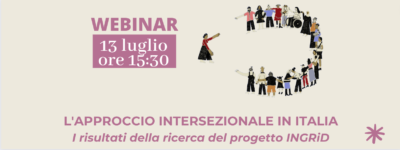The intersectional approach in Italy. The main results from the research project Ingrid

The research group of the Bruno Kessler Foundation’s Center for Religious Sciences (ISR-FBK)
presents to the public the results of the investigation of the intersectional approach in Italy,
conducted within the European project INGRiD (Intersecting Grounds of Discrimination in Italy).
In Italy there are numerous actors working on anti-discrimination. However, most of them focus
exclusively on single factors, such as gender, sexual orientation, nationality, skin color, religious
beliefs, etc., all components that, together with others, form the complex identity of each of us.
Individuals’ identities and situations of discrimination are more complex and multifaceted, and
intersectional theory moves from this premise. As part of the activities inherent in the INGRiD
project, the research delved into the notion of intersectionality and its social and legal applications.
The sociological study offer an interpretation of the main challenges that the intersectional
perspective poses to understanding and combating discrimination phenomena. The study offered
focuses on some Italian territories involved in INGRiD (see the report: Current anti-discrimination practices in Italy: an empirical analysis). In what ways does the intersectional dimension affect
discriminatory phenomena and is it handled by social actors engaged in the field of inclusion? Can
intersectionality be an effective interpretative key and intervention methodology for addressing
discriminatory phenomena?
In dialogue with the sociological study, a second research track with a legal perspective investigated
the application of the concept of intersectionality in international, European and Italian law in
particular (see the report: Intersectionality as a legal approach: a multilevel perspective between international law, European law, Italian law and comparative perspectives). Starting from a
comparative approach, a general resistance to the use of the category of intersectionality by
national and supranational courts is identified, preferring a monofactorial approach as a result also
of the difficulties in adapting the common law tradition within domestic legal systems. The case of
Italian courts, on the other hand, provides an interesting point for observing the possible use of the
intersectional approach: a rereading of some of the main antidiscrimination law pronouncements of national courts highlights how intersectionality constitutes a method of re-signifying categories of
discrimination by allowing a broader protection of complex subjective identities.
Presenting the Research:
Ilaria Valenzi, ricercatrice, FBK-ISR
Daniele Ferrari, ricercatore, Università di Siena
Valeria Fabretti, ricercatrice, FBK-ISR
Deborah S. Iannotti, ricercatrice, FBK-ISR
Introducing:
Rossella Vignola, Centro per la Cooperazione Internazionale
Moderator:
Giorgia Decarli, Sportello antidiscriminazioni Trento
To join the event please register at this link.
The webinar will be broadcast live on the Facebook pages of Fondazione Bruno Kessler and of Centro per la Cooperazione Internazionale.
The event is organised in the context of the Project INGRiD. Intersecting GRounds of Discrimination in Italy, co-funded by the European, Programme REC (Rights, Equality, Citizenship) 2014-2020.